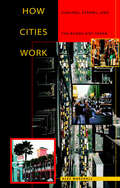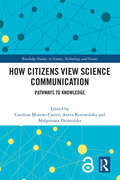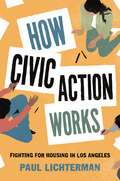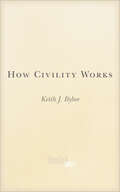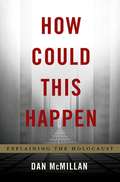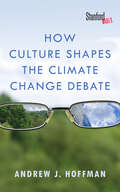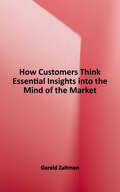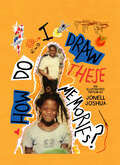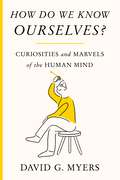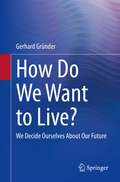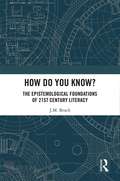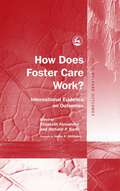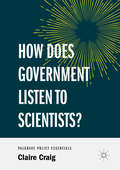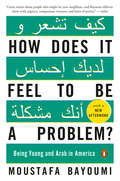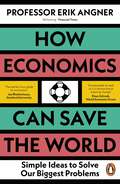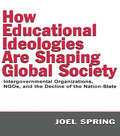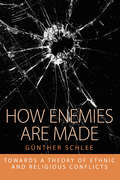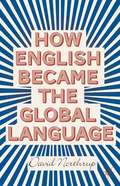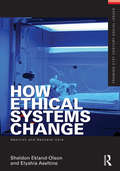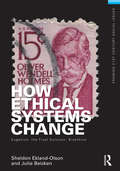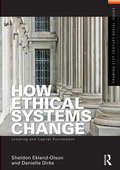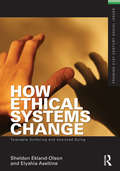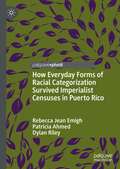- Table View
- List View
How Cities Work: Suburbs, Sprawl, and the Roads Not Taken (Constructs Series)
by Alex MarshallDo cities work anymore? How did they get to be such sprawling conglomerations of lookalike subdivisions, megafreeways, and "big box" superstores surrounded by acres of parking lots? And why, most of all, don't they feel like real communities? These are the questions that Alex Marshall tackles in this hard-hitting, highly readable look at what makes cities work. Marshall argues that urban life has broken down because of our basic ignorance of the real forces that shape cities-transportation systems, industry and business, and political decision making. He explores how these forces have built four very different urban environments-the decentralized sprawl of California's Silicon Valley, the crowded streets of New York City's Jackson Heights neighborhood, the controlled growth of Portland, Oregon, and the stage-set facades of Disney's planned community, Celebration, Florida. To build better cities, Marshall asserts, we must understand and intelligently direct the forces that shape them. Without prescribing any one solution, he defines the key issues facing all concerned citizens who are trying to control urban sprawl and build real communities. His timely book will be important reading for a wide public and professional audience.
How Citizens View Science Communication: Pathways to Knowledge (Routledge Studies in Science, Technology and Society)
by Carolina Moreno-Castro Aneta Krzewińska Małgorzata DzimińskaScience communication aims at the successful sharing and explanation of sciencerelated topics to a wider audience. In order to enhance communication between science and society, a better understanding of citizens’ habits and perceptions is needed. Therefore, it is vital to understand how citizens acquire knowledge about science- related issues, how this knowledge affects their beliefs, opinions and perceptions, and what sources of information they choose to learn about science – and how they assess their reliability. This book addresses these questions, based on the analyses of public consultations data from Italy, Poland, Portugal, Slovakia and Spain, concerned with the science communication of issues including climate change, vaccines, complementary and alternative medicine (CAM) and genetically modified organisms (GMOs). Sharing experiences of how to engage citizens in public consultation, it provides insights into the mobilisation of interest in science and offers recommendations on how to improve science communication.
How Civic Action Works: Fighting for Housing in Los Angeles (Princeton Studies in Cultural Sociology #9)
by Paul LichtermanThe ways that social advocates organize to fight unaffordable housing and homelessness in Los Angeles, illuminated by a new conceptual framework for studying collective actionHow Civic Action Works renews the tradition of inquiry into collective, social problem solving. Paul Lichterman follows grassroots activists, nonprofit organization staff, and community service volunteers in three coalitions and twelve organizations in Los Angeles as they campaign for affordable housing, develop new housing, or address homelessness. Lichterman shows that to understand how social advocates build their campaigns, craft claims, and choose goals, we need to move beyond well-established thinking about what is strategic.Lichterman presents a pragmatist-inspired sociological framework that illuminates core tasks of social problem solving, both contentious and noncontentious, by grassroots and professional advocates alike. He reveals that advocates’ distinct styles of collective action produce different understandings of what is strategic, and generate different dilemmas for advocates because each style accommodates varying social and institutional pressures. We see, too, how patterns of interaction create a cultural filter that welcomes some claims about housing problems while subordinating or delegitimating others. These cultural patterns help solve conceptual and practical puzzles, such as why coalitions fragment when members agree on many things, and what makes advocacy campaigns separate housing from homelessness or affordability from environmental sustainability. Lichterman concludes by turning this action-centered framework toward improving dialogue between social advocates and researchers.Using extensive ethnography enriched by archival evidence, How Civic Action Works explains how advocates meet the relational and rhetorical challenges of collective action.
How Civility Works
by Keith BybeeIs civility dead? Americans ask this question every election season, but their concern is hardly limited to political campaigns. Doubts about civility regularly arise in just about every aspect of American public life. Rudeness runs rampant. Our news media is saturated with aggressive bluster and vitriol. Our digital platforms teem with expressions of disrespect and trolls. Reflecting these conditions, surveys show that a significant majority of Americans believe we are living in an age of unusual anger and discord. Everywhere we look, there seems to be conflict and hostility, with shared respect and consideration nowhere to be found. In a country that encourages thick skins and speaking one's mind, is civility even possible, let alone desirable? In How Civility Works, Keith J. Bybee elegantly explores the "crisis" in civility, looking closely at how civility intertwines with our long history of boorish behavior and the ongoing quest for pleasant company. Bybee argues that the very features that make civility ineffective and undesirable also point to civility's power and appeal. Can we all get along? If we live by the contradictions on which civility depends, then yes, we can, and yes, we should.
How Could This Happen: Explaining the Holocaust
by Dan McmillanThe Holocaust is the defining event of the twentieth century - and perhaps all of modern history. Yet for too long, we have ignored the vital question of how and why such a monstrous event could have happened at all. Now, in How Could This Happen, historian Dan McMillan distills the existing Holocaust research into a cogent explanation of the genocide’s causes, revealing how a once progressive society like Germany could commit murder on such a massive scale. Countless barriers stand between stable societies and genocide, McMillan explains, but in Germany these buffers began to topple well before World War II. From Hitler’s meteoric rise to deep-rooted European anti-Semitism to the dehumanizing effects of World War I, McMillan uncovers the many factors that made the Holocaust possible. Persuasive and compelling, How Could This Happen illustrates how a perfect storm of bleak circumstances, malevolent ideas, and societal upheaval unleashed history’s most terrifying atrocity.
How Culture Shapes the Climate Change Debate
by Andrew J. HoffmanThough the scientific community largely agrees that climate change is underway, debates about this issue remain fiercely polarized. These conversations have become a rhetorical contest, one where opposing sides try to achieve victory through playing on fear, distrust, and intolerance. At its heart, this split no longer concerns carbon dioxide, greenhouse gases, or climate modeling; rather, it is the product of contrasting, deeply entrenched worldviews. This brief examines what causes people to reject or accept the scientific consensus on climate change. Synthesizing evidence from sociology, psychology, and political science, Andrew J. Hoffman lays bare the opposing cultural lenses through which science is interpreted. He then extracts lessons from major cultural shifts in the past to engender a better understanding of the problem and motivate the public to take action. How Culture Shapes the Climate Change Debate makes a powerful case for a more scientifically literate public, a more socially engaged scientific community, and a more thoughtful mode of public discourse.
How Customers Like to Buy
by Steve DeeryThis book takes a careful and detailed look at the personality types of buyers and the way the professional sales person needs to be aware of these when trying to make a sale.
How Customers Think: Essential Insights into the Mind of the Market
by Gerald ZaltmanHow to unlock the hidden 95 percent of the customer's mind that traditional marketing methods have never reached. This title provides a practical synthesis of the cognitive sciences. Drawing heavily on psychology, neuroscience, sociology, and linguistics, Zaltman combines academic rigor with real-world results to offer highly accessible insights, based on his years of research and consulting work with large clients like Coca-Cola and Procter & Gamble. An all-new tool kit: Zaltman provides research tools - metaphor elicitation, response latency, and implicit association techniques, to name a few - that will be all-new to marketers, and demonstrates how innovators can use these tools to get clues from the subconscious when developing new products and finding new solutions, long before competitors do.
How Digital Social Life Matters: New Frames for Social and Cultural Analysis (Media, Culture and Critique: Future Imperfect)
by David ToewsFocusing on two concepts that were central to modernism and continue to be important, albeit in different ways, this book explores the nature of the simple and the complex, and the relationship that exists between them. With attention to trends in big data and digital media, society, politics, and culture, and the shift from groups towards networks in social life, it considers how the simple is transformed by the new realities of the internet-powered, global society, and what its role might be in helping us to understand them, both from the point of view of methods in the social sciences and humanities, and in life. Rejecting the positivist idea that the simple remains a static background against which the open-ended complexity of our world continues to expand, the author contends that the growth in complexity is mirrored in the 'relativization of simplicity', a phenomenon that is highlighted by gradual social changes that the era of digital media is now making apparent.Through a series of questions raised by our new digital lives, How Digital Social Life Matters argues for significant changes in how we see the world. Focussing on the relationship between theory and methods, it offers a critical phenomenology of experiences associated with the network society and networked individualism in an era of ‘big data’. It uses an examination of the concept and phenomenon of the simple, unpacking its new dynamics, its new meanings and its new depth, as a way of demonstrating the need for new conceptions of the complex in such contexts as reality, the universe, and the cosmos. As such, it will appeal to social theorists, communication scholars, and philosophers with interests in the fields of relational sociology, digital media, and object-oriented ontology. It also engages more broadly with scholars with a sociologically-informed interest in reimagining the social roles of politics, science, nature, media, globalization, the environment, and social interaction for our new digital era.
How Do I Draw These Memories?: An Illustrated Memoir
by Jonell JoshuaJonell Joshua spent her childhood shuttling back and forth between Savannah and New Jersey – living in grandparents’ homes during the times her mother, struggling with mental illness, needed support to raise her and her brothers. Together the family found a way to keep going even in the darkest of times. How Do I Draw These Memories? is an illustrated memoir about nostalgia, faith, the preciousness of life, and unconditional love. From Jonell’s devastatingly brilliant pen as a writer and an artist, it plumbs the depths of what family can be – and how joy and hope can be found in the most ordinary and extraordinary moments. P R A I S E "Ingenious… a vulnerable, revealing homage to family." —Booklist "Despite the difficulties confronting Jonell’s family, this memoir is uplifting and amazingly positive, in some ways celebrating the ordinariness of life as well as the power of unconditional love (which I hope) most experience. Readers are likely to recognize something of their own lives in this memoir." —Reading Rockets
How Do We Know Ourselves?: Curiosities and Marvels of the Human Mind
by David G. Myers“Each chapter is a gem of insight into the human experience, cut and polished to perfection by the renowned psychologist David Myers. Better than any book I can recall, this book answers questions about why we think, feel, and act as we do—but also makes us curious to learn more.” —Angela DuckworthA delightful tour of the wonders of our humanity from David G. Myers, the award-winning professor and author of psychology’s bestselling textbook.Over the past three decades, millions of students have learned about psychology from textbooks by David G. Myers. To create these books and to satisfy his own endless curiosity about the human mind, Myers monitors the leading journals to discover the most extraordinary developments in psychological science.How Do We Know Ourselves? is a compendium of the most wondrous verities that Myers has found, revealing thought-provoking insights into our everyday lives. His astute observations and sharp-witted wisdom enable readers to think smarter and live happier.Myers’s subjects range from why we so often fear the wrong things to how simply going for a walk with someone can increase rapport and empathy. He reveals why we repeatedly mishear song lyrics and how the color of President Obama’s suits aided in his decision-making. Myers also explores the powers and perils of our intuition, explaining why anything can seem obvious once it happens.These forty essays offer fresh insight into our sometimes bewildering but ever-fascinating lives. Myers is engaging and intellectually provocative, and he brings a wealth of knowledge from more than fifty years of teaching and writing about psychology to this lively and informative collection. He inspires us to ponder timeless questions, including what might be the most intriguing one of all: How do we know ourselves?
How Do We Want to Live?: We Decide Ourselves About Our Future
by Gerhard GründerDo you also ask yourself how much your thinking, feeling and behavior are determined by your genes and biology? Do you doubt that interfering with our brain chemistry will make us happier and more content people? Are you skeptical that computer algorithms can capture your essence as a human being?This nonfiction book challenges the worldview of "divine man" (Harari), in which humans are determined by their biology and medicine serves to optimize them. The author shows that we are the active designers of our living conditions and thus determine our own physical and mental health.Be inspired to participate in shaping the future of a human society in which we have to decide where we live, how we live with each other, how we work, and how we educate ourselves. Target Audiences:Ideal for anyone interested in the fundamentals of brain research, psychology, and psychiatry, and who is concerned about the nature of human beings and their future.About the Author: Prof. Dr. Gerhard Gründer, psychiatrist and psychotherapist, is a professor at the University of Heidelberg. He heads the Department of Molecular Neuroimaging at the Central Institute of Mental Health in Mannheim. This book is a translation of the original German 1st edition Wie wollen wir leben? by Gerhard Gründer, published by Springer-Verlag GmbH, DE, part of Springer Nature in 2020. The translation was done with the help of artificial intelligence (machine translation by the service DeepL.com). A subsequent human revision was done primarily in terms of content, so that the book will read stylistically differently from a conventional translation. Springer Nature works continuously to further the development of tools for the production of books and on the related technologies to support the authors.
How Do You Know?: The Epistemological Foundations of 21st Century Literacy
by J.M. BeachThis book defines the concept and practices of literacy through a discussion of knowledge, information media, culture, subjectivity, science, communication, and politics. Examining the ways in which the spread of literacy and education have caused culture wars in pluralist societies since the 16th century, the author reviews an interdisciplinary array of scholarly literature to contend that science, and more broadly evidence-based inductive arguments, offer the only reliable source information, and the only peaceful solution to cultural conflict in the 21st century. With a focus on the multifaceted practice of literacy-as-communication as embedded within larger social and political processes, this book offers a comprehensive study of literacy through five core topics: knowledge, psychology, culture, science, and arguing over truth in pluralist democracies. The central thesis of the book argues that we require a new literacy that incorporates reading and writing with advanced cognitive and epistemological skills. Today’s citizens need to be able to understand the basic cognitive and cultural processes through which knowledge is created, and they need to know how to evaluate knowledge, peacefully debate knowledge, and productively use knowledge, for both personal decisions and public policy. How Do You Know? The Epistemological Foundations of 21st Century Literacy is an interdisciplinary study that will appeal to scholars across the sciences and humanities, especially those concerned with pedagogy and the science of learning.
How Does Foster Care Work?
by Elizabeth Fernandez Richard P. BarthHow Does Foster Care Work? is an international collection of empirical studies on the outcomes of children in foster care. Drawing on research and perspectives from leading international figures in children's services across the developed world, the book provides an evidence base for programme planning, policy and practice. This volume establishes a platform for comparison of international systems, trends and outcomes in foster care today. Each contributor provides a commentary on one other chapter to highlight the global significance of issues affecting children and young people in care. Each chapter offers new ideas about how foster care could be financed, delivered or studied in order to become more effective. This book is important reading for anyone involved in delivering child welfare services, such as administrators, practitioners, researchers, policy makers, children's advocates, academics and students.
How Does Government Listen to Scientists?
by Claire CraigThis Palgrave Policy Essential draws together recent developments in the field of science in government, policy and public debate. Practice and academic insights from a wide variety of fields have both moved on in the last decade and this book provides a consolidated survey of the relatively well established but highly scattered set of insights about the provision of deeply technical expertise in policy making (models of climate or disease, risk, Artificial Intelligence and ethics, and so on). It goes on to link this to emerging ideas about futures thinking, public engagement, narrative, and the role of values and sentiment alongside the place of scientific and scholarly insights in public decision-making and debate. The book offers an accessible overview aimed at practitioners; policy-makers looking to understand how to work with researchers, researchers looking to work with policy-makers, and the increasing numbers and types of “brokers” - people working at the interface, in science advice, public engagement and communication of science, and in expert support to decision-making in the public and private sectors. In addition to outlining recent insights and placing them in the established frameworks of authors such as Pielke and Jasanoff, the book also brings in relevant areas less traditionally associated with the subject but of increasing importance, such as modelling, futures and narrative.
How Does It Feel to Be a Problem?: Being Young and Arab in America
by Moustafa BayoumiAn eye-opening look at how young Arab- and Muslim- Americans are forging lives for themselves in a country that often mistakes them for the enemy Just over a century ago , W.E.B. Du Bois posed a probing question in his classic The Souls of Black Folk: How does it feel to be a problem? Now, Moustafa Bayoumi asks the same about America's new "problem"-Arab- and Muslim-Americans. Bayoumi takes readers into the lives of seven twenty-somethings living in Brooklyn, home to the largest Arab-American population in the United States. He moves beyond stereotypes and clichés to reveal their often unseen struggles, from being subjected to government surveillance to the indignities of workplace discrimination. Through it all, these young men and women persevere through triumphs and setbacks as they help weave the tapestry of a new society that is, at its heart, purely American.
How Economics Can Save the World: Simple Ideas to Solve Our Biggest Problems
by Erik AngnerEconomics has the power to make the world a better, happier and safer place: this book shows you howOur world is in a mess. The challenges of climate change, inequality, hunger and a global pandemic mean our way of life seems more imperilled and society more divided than ever; but economics can help!From parenting to organ donation, housing to anti-social behaviour, economics provides the tools we need to fix the biggest issues of today. Far from being a means to predict the stock market or enrich the elite, economics provides a lens through which we can better understand how things work, design clever solutions and create the conditions in which we can all flourish.With a healthy dose of optimism, and packed with stories of economics in everyday situations, Erik Angner demonstrates the methods he and his fellow economists use to help improve our lives and the society in which we live. He shows us that economics can be a powerful force for good, awakening the possibility of a happier, more just and more sustainable world.
How Educational Ideologies Are Shaping Global Society: Intergovernmental Organizations, NGOs, and the Decline of the Nation-State (Sociocultural, Political, and Historical Studies in Education)
by Joel SpringIn this book Joel Spring explores three major international educational ideologies that are shaping global society: neo-liberal educational ideology, human rights education, and environmentalism. Neo-liberal ideology reflects a rethinking of nationalist forms of education as the nation-state slowly erodes under the power of a growing global civil society. Traditional nationalist education attempts to mold loyal and patriotic citizens who are emotionally attached to symbols of the state, whereas the goal of neo-liberal educational ideology is to change nationalist education to serve the needs of the global economy. These changes are fueling a clash between the ideas of free-market and consumer-based neo-liberals and those of human rights and environmental educators. Human rights education is concerned with creating activist global citizens. It is rooted in the idea that inherent in human rights doctrines is a collective responsibility to ensure the rights of all people. Environmentalism is the most radical of the ideologies because it rejects the industrial and consumerist paradigm that has dominated most economic thought, including capitalism and communism. Spring synthesizes and analyzes the effect of these educational ideologies on shaping the future of the global society. In the concluding section, he compares the effect of these ideologies on global society with the possibility of a world divided between conflicting civilizations. How Educational Ideologies Are Shaping Global Society: Intergovernmental Organizations, NGOs, and the Decline of the Nation-State features: *a critical exploration of the transition of schooling from a function of the nation-state to a globalized economic and political system; *a discussion of the major organizations and trading blocs shaping the future globalization of educational policies; *an analysis of the major competing global ideologies of education--including national and corporate models that emphasize training workers for a competitive global free market; the worldwide network of human rights and peace educators who are teaching a global set of ethics; and the environmental movement's efforts to create a common set of educational standards for sustainable development and sustainable consumption; and *an exploration of the possible future of global educational policy and school organizations. By integrating a wide range of previously scattered information within a bold new framework for understanding educational ideologies and their impact on the global society, Spring raises important questions for researchers, professionals, and students in history and philosophy of education, educational policy, educational studies, comparative education, multicultural education, curriculum studies, critical media studies, global studies, human rights education, and related areas.
How Enemies Are Made
by Günther SchleeIn popular perception cultural differences or ethnic affiliation are factors that cause conflict or political fragmentation although this is not borne out by historical evidence. This book puts forward an alternative conflict theory. The author develops a decision theory which explains the conditions under which differing types of identification are preferred. Group identification is linked to competition for resources like water, territory, oil, political charges, or other advantages. Rivalry for resources can cause conflicts but it does not explain who takes whose side in a conflict situation. This book explores possibilities of reducing violent conflicts and ends with a case study, based on personal experience of the author, of conflict resolution.
How English Became The Global Language
by David NorthrupIn this book, the first written about the globalization of the English language by a professional historian, the exploration of English's global ascendancy receives its proper historical due. This brief, accessible volume breaks new ground in its organization, emphasis on causation, and conclusions.
How Ethical Systems Change: Abortion and Neonatal Care (Framing 21st Century Social Issues)
by Sheldon Ekland-Olson Elyshia AseltineRoe v. Wade came like a bolt from the blue, but support had been building for years. For many, the idea that life in the womb was not fully protected under the Constitution was simply not acceptable. Political campaigns were organized and protests launched, including the bombing of clinics and the killing of abortion providers. Questions about the protection and support of life continued after birth. This book is based on a hugely popular undergraduate course taught at the University of Texas, and is ideal for those interested in the social construction of social worth, social problems, and social movements. This book is part of a larger text, Who Lives, Who Dies, Who Decides?, http://www.routledge.com/books/details/9780415892476/
How Ethical Systems Change: Eugenics, the Final Solution, Bioethics (Framing 21st Century Social Issues)
by Sheldon Ekland-Olson Julie BeickenMandatory sterilization laws enacted in dozens of states coast-to-coast and approved by the U.S. Supreme Court formed the initial pillar for what became the Final Solution. Following WWII, there was renewed interest in a more inclusive view of social worth and the autonomy of the individual. Social movements were launched to secure broad-based revisions in civil and human rights. This book is based on a hugely popular undergraduate course taught at the University of Texas, and is ideal for those interested in science-based policy, the social construction of social worth, social problems, and social movements. This book is an excerpt from a larger text, Who Lives, Who Dies, Who Decides?, http://www.routledge.com/9780415892476/
How Ethical Systems Change: Lynching And Capital Punishment (Framing 21st Century Social Issues)
by Sheldon Ekland-Olson Danielle DirksSlavery, lynching and capital punishment were interwoven in the United States and by the mid-twentieth century these connections gave rise to a small but well-focused reform movement. Biased and perfunctory procedures were replaced by prolonged trials and appeals, which some found messy and meaningless; DNA profiling clearly established innocent persons had been sentenced to death. The debate over taking life to protect life continues; this book is based on a hugely popular undergraduate course taught at the University of Texas, and is ideal for those interested in criminal justice, social problems, social inequality, and social movements. This book is an excerpt from a larger text, Who Lives, Who Dies, Who Decides?, http://www.routledge.com/9780415892476/
How Ethical Systems Change: Tolerable Suffering And Assisted Dying (Framing 21st Century Social Issues)
by Sheldon Ekland-Olson Elyshia AseltineMedical advances prolong life. They also sometimes prolong suffering. Should we protect life or alleviate suffering? This dilemma formed the foundation for a powerful right-to-die movement and a counterbalancing concern over an emerging culture of death. What are the qualities of a life worth living? Where are the boundaries of tolerable suffering? This book is based on a hugely popular undergraduate course taught at the University of Texas, and is ideal for those interested in the social construction of social worth, social problems, and social movements. This book is part of a larger text, Who Lives, Who Dies, Who Decides?, http://www.routledge.com/9780415892476/
How Everyday Forms of Racial Categorization Survived Imperialist Censuses in Puerto Rico
by Dylan Riley Rebecca Jean Emigh Patricia AhmedThis book examines the history of racial classifications in Puerto Rico censuses, starting with the Spanish censuses and continuing through the US ones. Because Puerto Rican censuses were collected regularly over hundreds of years, they are fascinating “test cases” to see what census categories might have been available and effective in shaping everyday ones. Published twentieth-century censuses have been well studied, but this book also examines unpublished documents in previous centuries to understand the historical precursors of contemporary ones. State-centered theories hypothesize that censuses, especially colonial ones, have powerful transformative effects. In contrast, this book shows that such transformations are affected by the power and interests of social actors, not the strength of the state. Thus, despite hundreds of years of exposure to the official dichotomous and trichotomous census categories, these categories never replaced the continuous everyday ones because the census categories rarely coincided with Puerto Rican’s interests.
